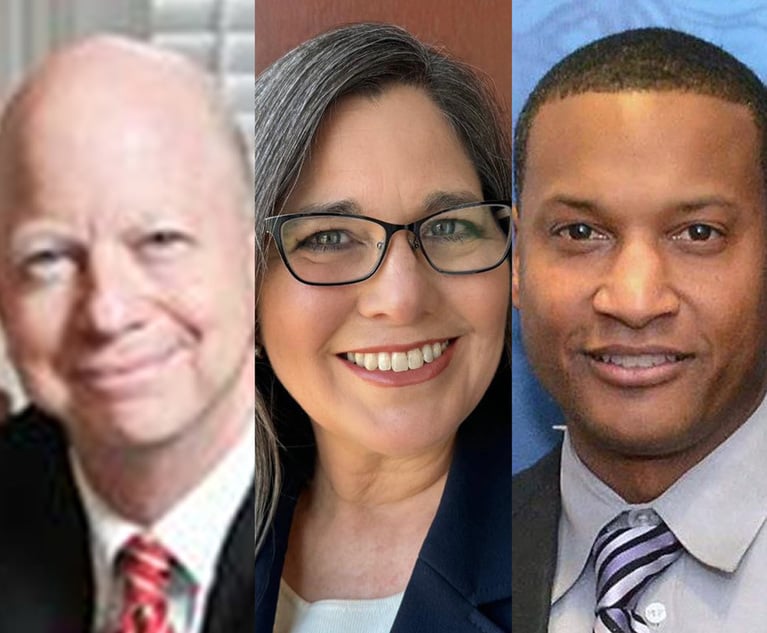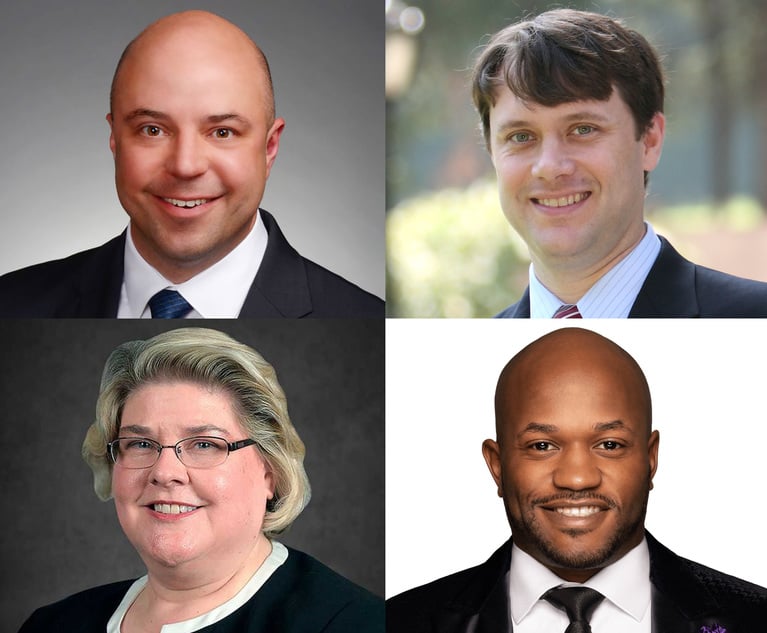 Shari Klevens (left) and Alanna Clair, Dentons. (Courtesy photo)
Shari Klevens (left) and Alanna Clair, Dentons. (Courtesy photo)Who's Listening in Your Elevator, Rideshare or Airplane?
Remember to protect your clients' secrets in these and other public spaces.
February 10, 2020 at 01:05 PM
6 minute read
Many attorneys rely on rideshare companies to get them to meetings, the airport or for other job functions. Recently, some rideshare companies have initiated audio and video recording programs allowing drivers to record video and/or audio during all trips. Rideshare companies indicate that recording driver and passenger will protect them both.
But what about those circumstances when an attorney engages in an off-the-cuff conversation with a colleague regarding a client confidential matter in the back of a rideshare vehicle, which is then recorded by the driver? Could opposing counsel subpoena the footage? Could the driver go to the media?
Sometimes attorneys let their guards down in situations that could pose a risk to attorney-client confidentiality or privilege. Although lawyers generally are familiar with the protections of the attorney-client privilege, lawyers are often less familiar with the precise requirements of Rule 1.6 of the Georgia Rules of Professional Conduct, which contains confidentiality requirements that are typically broader than the privilege. Indeed, under Rule 1.6, confidential information can include client identity, business information and other sensitive information—even if it is otherwise publicly available, as discussed in ABA Formal Opinions 479 and 480. And Rule 1.6 calls on lawyers to maintain in confidence all information gained in the professional relationship with a client, even after the client-lawyer relationship has terminated, unless the client gives informed consent or the disclosure is impliedly authorized.
With today's seemingly never-ending expectations to be available and on-call, lawyers can sometimes forget their surroundings in their efforts to be efficient. Below are four common public spaces where lawyers inadvertently or unintentionally broadcast confidential/privileged information and tips for reducing the risks that arise in those scenarios.
Elevator
For most attorneys, each day includes at least two rides in the elevator: one going into the office and one leaving the office. It's not hard to imagine being on an elevator with a colleague discussing a case. When the elevator stops on another floor and a stranger gets on, did you stop your conversation? Many attorneys may simply assume that the stranger on the car has no interest in the conversation, but that can come with risk, especially given that the legal community can be quite small.
Some attorneys think they can speak in "code," without identifying people or places. However, that approach may not do enough to protect or maintain confidentiality. A better practice is to avoid having the conversation altogether when others are within earshot.
Rideshare/Cab/Car Service
As noted above, because many attorneys are overscheduled, they may routinely take phone calls while in transit or discuss matters in the back of a cab while on their way to a meeting. Such communications are technically in the presence of an unauthorized third party.
Sometimes it is not feasible to implement a blanket prohibition on phone calls or discussions about client work while in a cab or rideshare. However, any calls can be handled while wearing headphones, rather than on speakerphone. This can help minimize the risk that the entire conversation can be overheard by the driver. It also helps the lawyer block out background noise—so some lawyers will ask the driver to turn on the radio and/or crack the windows to block the driver's ability to completely hear what the lawyer is discussing on the call, without impacting the quality of the lawyer's call.
Courthouse
Courthouses are often bustling with activity. Dozens of like-minded professionals are all in a small space, reviewing documents and preparing for court. Attorneys may feel lulled into a false sense of security—everyone is focused on their own business, so attorneys may be less careful about discussing confidential information than they otherwise would be. And like the above scenarios, when urgent matters must be addressed, attorneys may not have a choice about when and where to address them.
It is easy to imagine sitting with your colleague near the courtroom, discussing strategy for the upcoming hearing or your personal feelings about opposing counsel. You might even look around to make sure that you don't recognize anyone within earshot before having your discussion. But it is easy to be overheard by another lawyer who is on the matter but has not yet entered an appearance, or even an attorney with no connection to the matter who knows your opposing counsel and recognizes the name.
Not surprisingly, such situations occur quite frequently and to even the most seasoned lawyers. Recently, there has been significant media coverage of reporters who have simply overheard attorneys at lunch—in Washington, D.C., and elsewhere—discussing high-profile representations as if they were alone in a conference room. Like the other scenarios above, it is important to be mindful of your surroundings and avoid having discussions about ongoing matters until you can find an empty hallway or jury room.
Airplanes
As the practice of law becomes increasingly national—and even international—in scope, air travel has become a routine part of attorney life. In order to maximize their time in the air, many attorneys engage in client work while traveling. However, a seatmate on an airplane could get glimpses into a client's confidential information.
Reviewing pleadings, draft briefs or correspondence on a plane is often a necessary part of work travel, but there are steps attorneys can take to protect the confidential aspect of their work from prying eyes. For example, most laptops are compatible with an inexpensive, thin privacy shield that can attach to the computer screen. The privacy screen will allow the attorney to read everything on the screen clearly, but will block the views of those peeking from an angle. Also, use of a VPN or a two-tiered security structure helps to reduce the vulnerability of laptops.
By taking extra steps to help ensure that confidences remain confidential in public places, attorneys are reducing their own risk—and the likelihood of a client who is unhappy that their confidences have become public.
Shari L. Klevens is a partner at Dentons in Atlanta and Washington, D.C., and serves on the firm's U.S. board of directors. She represents and advises lawyers and insurers on complex claims and is co-chair of Dentons' global insurance sector team.
Alanna Clair, also a partner at the firm in Washington, focuses on professional liability and insurance defense. Klevens and Clair are co-authors of "The Lawyer's Handbook: Ethics Compliance and Claim Avoidance" and the 2020 edition of "Georgia Legal Malpractice Law."
This content has been archived. It is available through our partners, LexisNexis® and Bloomberg Law.
To view this content, please continue to their sites.
Not a Lexis Subscriber?
Subscribe Now
Not a Bloomberg Law Subscriber?
Subscribe Now
NOT FOR REPRINT
© 2024 ALM Global, LLC, All Rights Reserved. Request academic re-use from www.copyright.com. All other uses, submit a request to [email protected]. For more information visit Asset & Logo Licensing.
You Might Like
View All

Who Got the Work: 16 Lawyers Appointed to BioLab Class Action Litigation
4 minute read

'Possible Harm'?: Winston & Strawn Will Appeal Unfavorable Ruling in NASCAR Antitrust Lawsuit
3 minute readLaw Firms Mentioned
Trending Stories
- 1Hit by Mail Truck: Man Agrees to $1.85M Settlement for Spinal Injuries
- 2Anticipating a New Era of 'Extreme Vetting,' Big Law Immigration Attys Prep for Demand Surge
- 3Deal Watch: What Dealmakers Are Thankful for in 2024
- 4'The Court Will Take Action': Judge Upbraids Combative Rudy Giuliani During Outburst at Hearing
- 5Attorney Sanctioned for Not Exercising Ordinary Care: This Week in Scott Mollen’s Realty Law Digest
Who Got The Work
Michael G. Bongiorno, Andrew Scott Dulberg and Elizabeth E. Driscoll from Wilmer Cutler Pickering Hale and Dorr have stepped in to represent Symbotic Inc., an A.I.-enabled technology platform that focuses on increasing supply chain efficiency, and other defendants in a pending shareholder derivative lawsuit. The case, filed Oct. 2 in Massachusetts District Court by the Brown Law Firm on behalf of Stephen Austen, accuses certain officers and directors of misleading investors in regard to Symbotic's potential for margin growth by failing to disclose that the company was not equipped to timely deploy its systems or manage expenses through project delays. The case, assigned to U.S. District Judge Nathaniel M. Gorton, is 1:24-cv-12522, Austen v. Cohen et al.
Who Got The Work
Edmund Polubinski and Marie Killmond of Davis Polk & Wardwell have entered appearances for data platform software development company MongoDB and other defendants in a pending shareholder derivative lawsuit. The action, filed Oct. 7 in New York Southern District Court by the Brown Law Firm, accuses the company's directors and/or officers of falsely expressing confidence in the company’s restructuring of its sales incentive plan and downplaying the severity of decreases in its upfront commitments. The case is 1:24-cv-07594, Roy v. Ittycheria et al.
Who Got The Work
Amy O. Bruchs and Kurt F. Ellison of Michael Best & Friedrich have entered appearances for Epic Systems Corp. in a pending employment discrimination lawsuit. The suit was filed Sept. 7 in Wisconsin Western District Court by Levine Eisberner LLC and Siri & Glimstad on behalf of a project manager who claims that he was wrongfully terminated after applying for a religious exemption to the defendant's COVID-19 vaccine mandate. The case, assigned to U.S. Magistrate Judge Anita Marie Boor, is 3:24-cv-00630, Secker, Nathan v. Epic Systems Corporation.
Who Got The Work
David X. Sullivan, Thomas J. Finn and Gregory A. Hall from McCarter & English have entered appearances for Sunrun Installation Services in a pending civil rights lawsuit. The complaint was filed Sept. 4 in Connecticut District Court by attorney Robert M. Berke on behalf of former employee George Edward Steins, who was arrested and charged with employing an unregistered home improvement salesperson. The complaint alleges that had Sunrun informed the Connecticut Department of Consumer Protection that the plaintiff's employment had ended in 2017 and that he no longer held Sunrun's home improvement contractor license, he would not have been hit with charges, which were dismissed in May 2024. The case, assigned to U.S. District Judge Jeffrey A. Meyer, is 3:24-cv-01423, Steins v. Sunrun, Inc. et al.
Who Got The Work
Greenberg Traurig shareholder Joshua L. Raskin has entered an appearance for boohoo.com UK Ltd. in a pending patent infringement lawsuit. The suit, filed Sept. 3 in Texas Eastern District Court by Rozier Hardt McDonough on behalf of Alto Dynamics, asserts five patents related to an online shopping platform. The case, assigned to U.S. District Judge Rodney Gilstrap, is 2:24-cv-00719, Alto Dynamics, LLC v. boohoo.com UK Limited.
Featured Firms
Law Offices of Gary Martin Hays & Associates, P.C.
(470) 294-1674
Law Offices of Mark E. Salomone
(857) 444-6468
Smith & Hassler
(713) 739-1250






